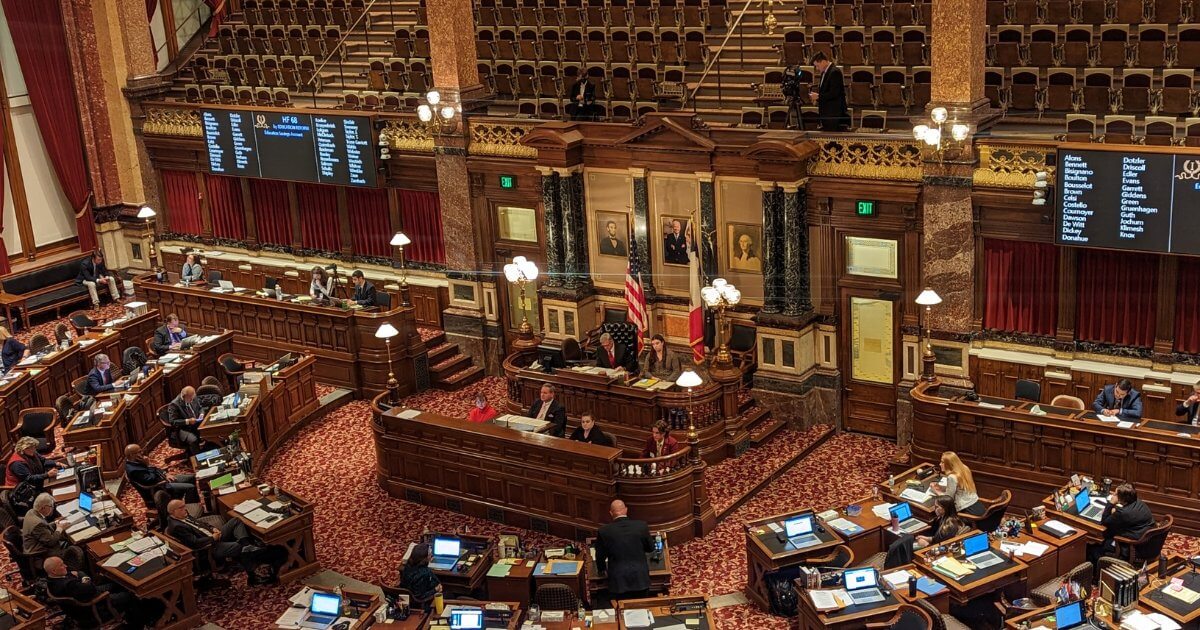
Photo by Starting Line Staff
In today’s hyper-partisan, emotion-fueled political environment, where policy proposals are seemingly presented and defended with facile slogans and tribal appeals, how can any citizen differentiate between the truly good and beneficial ones and those that either serve only a few or harm or denigrate others?
I would like to advance a modest proposal based upon what I learned from my 12 years of serving in elected office—three of them on Davenport’s City Council and the other nine as a member of the Iowa House of Representatives—and then further utilized in my 17 years as the benefits administrator of the Iowa Public Employees’ Retirement System:
Expect—and demand—that all policy proposals “prove” their worth.
Rhetoric or assurances that this will be good for you are, honestly, as substantial as vapor. We need governors and legislators to “get real” again by making a verifiable fact-based case for any proposal!
What would such a “case” look like?
Well, first we would assess proposals using the standard of what the Founders of our Constitution called “civic virtue,” which simply means always looking to protect and advance the good of all over considerations of self-interest or the good of a few. This used to be known as seeking the good of the commonwealth.
And civic virtue was one of the chief concerns Benjamin Franklin had in mind when he replied to someone asking what kind of government the new Constitution represented: “A Republic, if you can keep
it.”
I believe that the current struggles governments at both the state and federal levels are experiencing is that both elected officials and citizens have forgotten all about civic virtue, including its concept and its use in assessing policy. But it is, in fact, simple to “use.”
We just have to ask: How is x going to serve the interests of all Iowans (or Americans, when examining federal legislation)? Does it help, empower, ennoble all, or would it effectively either serve only some or—worse—negatively impact a segment of our citizenry? Clearly, any policy proposal that failed this test would not deserve support!
But there is a second criterion that is far less “abstract.” Prove, using verifiable data, that proposal X is not only not harmful to the many—or even a few—but is also:
- Necessary, or
- An improvement, or
- A better alternative.
Let us apply these two criteria to a couple of current important and ongoing policy changes in Iowa:
Eliminating Iowa’s income tax and/or reducing it to a minimal flat tax. Where is the verifiable data that supports such efforts? In other words, what proves that changing the income tax system in such a fundamental way will work to the benefit of all Iowans?
How adequately is Iowa now meeting its essential purposes with the existing revenue stream with regard to such things as cleaning up Iowa’s waterways, adequately funding our public schools, assisting students of modest income to be able to attend the college, community college, or skills training school of their choice? (And I’m sure this list can be added to.)
Was such a question even considered? If so, where is the data that supports these changes?
How does Iowa’s over-all tax structure compare with those of all other US states, with respect to adequacy, equity, and flexibility? Has the alternative of lowering the property tax, one of the less equitable means of taxation, and shifting some of the support for schools and other public services to an expanded and progressive income tax, been considered? Why or why not? Wouldn’t such data be interesting and informative in helping citizens evaluate tax proposals?
How will the current proposals, if brought to fulfillment, impact individuals—especially the moderate- and low-income vis-à-vis the wealthier—communities, schools, and other as yet unmet but important needs?
Using public tax dollars to assist students attending private and/or charter schools. Where is the data supporting the wisdom and benefit of this policy?
Are public schools now receiving the funds teachers and students need? (Data, please.) Wouldn’t it be logical to first move to improve and enhance existing public schools rather than to support students moving away from them? How does the use of public tax dollars for private (including religious) education square with the US Constitution’s First Amendment? How does this policy affect students who do not have private or charter schools available to them?
In other words, isn’t this a policy that in fact advantages some but not all?
If the State wishes to use tax dollars to support private and charter schools, does it not also follow that such schools must meet all state mandates which already apply to public schools? Why or why not?
While this may appear at first as a tad “hard-nosed,” it is actually what citizens deserve to know. And, for the record, it’s what we in the Iowa Legislature used to accept as common sense. These are the
questions we asked of each other all the time, in committee and in floor debate.
A final irony: I was taught these things—including the high ethical standards anyone serving in the Iowa House was expected to meet—by Republican elders in 1973.
My freshman year in the House was one in which I was in the minority, and the Speaker of the House—and all committee chairpersons—were Republicans. They were wise and honorable men and women who tried to instill civic virtue in us newcomers. Grateful, I have tried to apply the lessons they taught me throughout my life.
I hope that by using such approaches we can someday return to the more gracious, accepting, and peace-filled Iowa that I once knew.
Greg Cusack, born and raised in Davenport, was a college teacher of American history and political science, a member of the Davenport City Council and the Iowa House of Representatives, executive director of the National Catholic Rural Life Conference, and benefits administrator of the Iowa Public Employees’ Retirement System. He can be reached at [email protected].

University of Iowa ranks high in US News grad school rankings
The University of Iowa boasts 52 programs recognized by US News for excellence, with rankings in the top five, highlighting its diverse academic...

Why the floodgates are open to help the wealthiest Iowans pay for their private education
Iowa Republican lawmakers have passed a bill to boost K-12 education funding by 2%—not nearly enough to keep pace with what’s needed for a...

Inside University of Iowa’s Fulbright program: A legacy of excellence
University of Iowa shines as a Fulbright Top Producer, sending students and alumni worldwide to teach, research, and build international...

Op-ed: On Governor’s Voucher Law, Some Claims About Accountability Don’t Add Up
Recently, an argument has been going around that goes like this: private schools are accredited to teach students, therefore they’re accountable to...

Guest post: If we want to fix education, fully fund public schools
It hasn’t been good news for Iowa’s public schools recently. The Waterloo Community School District announced budget cuts of over $10 million for...

Why this Iowa special ed teacher is worried for her students as the DOE is dismantled
President Trump signed an executive order Thursday, calling for the dismantling of the Department of Education. That’s going to take away from all...




